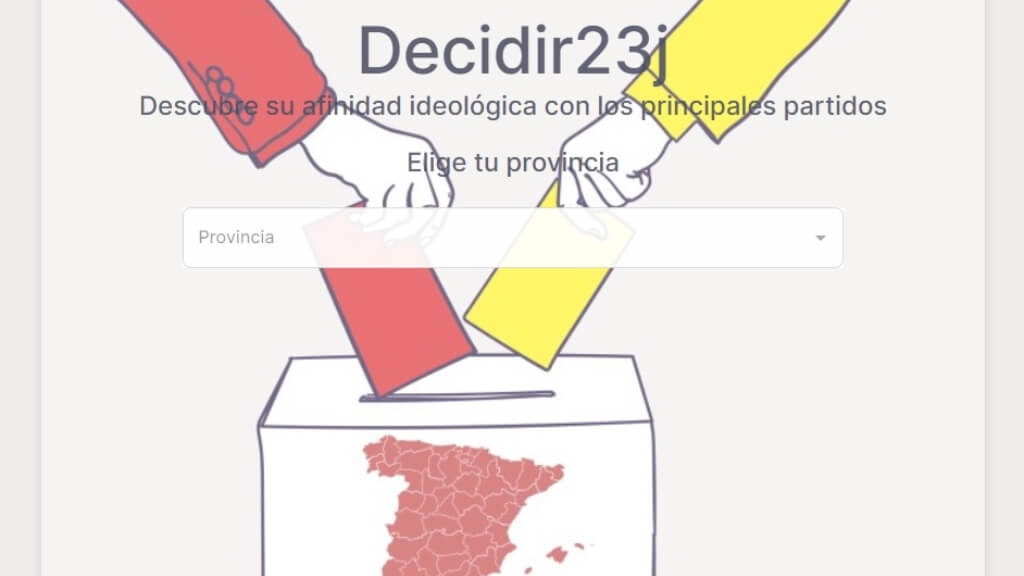UPF and UOC researchers launch Decidir23J, a tool to help voters decide who to vote for in Spain's upcoming general elections
The online voting advice application uses a 25-question survey to match voters and political parties
On 23 July, Spanish citizens will once again go to the polls to vote in the country's general election. Anyone who has not yet decided which party to vote for can turn to Decidir23J, a voting advice application designed by researchers at Pompeu Fabra University (UPF) and the Universitat Oberta de Catalunya (UOC) to help users find out which political party has the policies most in line with their views.
This voting advice application (VAA) was used in an adapted format in the recent Barcelona municipal elections on 28 May under the name DecidirBCN. It is an online resource that uses a 25-question survey to match voters' preferences with political parties.
The application, which is not-for-profit and not associated with any political party or organization, does not gather any personal information, and the data entered is completely anonymous. It was designed by Toni Rodon, a lecturer at the UPF's Department of Political and Social Sciences; Marc Guinjoan, an associate professor at the UOC's Faculty of Law and Political Science; and Nikandros Ioannidis, a PhD student on the UPF's programme in Political and Social Sciences.
According to Rodon, "the Decidir23J tool to help people decide who to vote for picks up from where we left of with the simulator for the municipal elections in Barcelona, but we've adapted it to Spain as a whole and to the general elections. From an academic perspective, it will help us do research in various areas, on how different issues affect voting and how people say they are going to vote".
Meanwhile, Guinjoan explained that Decidir23J will work "in the same way" as DecidirBCN: "There are 25 questions that we coded beforehand, positioning each party as they relate to each one. The VAA shows the proximity between the party and the user based on where we have placed the party and the user's answer to each question." The questions cover social and territorial issues on a two-dimensional axis.
The app includes sub-advisers for different territories in Spain (Catalonia, Basque Country, Galicia and the Canary Islands). Voters answering the survey in these regions will find the tool is based on their own party system and will be available for them in the different languages used in Spain.
How does Decidir23J work and what sections does it include?
The tool starts by creating a small personal profile based on age, gender, area of residence, level of education, employment status, degree of interest in politics, and sense of belonging.
The central section is the survey, which contains questions on various topics. These include social issues such as gender politics, Spain's transgender law or Islam. Other areas include questions on the economy, wealth redistribution, taxes and eviction orders. Spain's nationality issues are also included in the survey, with questions about decentralization, language immersion, referenda and the historical memory law.
Once the user has completed and submitted the survey, the application provides graphs showing their ideological affinity with each political party. It also shows a map that places the voter and these parties on a two-dimensional axis showing their position in both in left- and right-wing terms, and as regards the centralization-decentralization debate.
What was the creative process behind Decidir23J?
Many people contributed to the creation of the tool by filtering questions. First, the authors prepared a large set of questions related to current affairs in Spain. This set was sent to several experts, who were asked to codify it based on the content of the different manifestos and what they believed the parties' position to be. The most relevant questions that captured specific dimensions were then selected by means of statistical analysis. Finally, the tool was tested on a number of people to see how it worked before it was launched.
This UOC research project supports United Nations Sustainable Development Goal (SDG) 16, Peace, Justice and Strong institutions.
UOC R&I
The UOC's research and innovation (R&I) is helping overcome pressing challenges faced by global societies in the 21st century by studying interactions between technology and human & social sciences with a specific focus on the network society, e-learning and e-health.
Over 500 researchers and more than 50 research groups work in the UOC's seven faculties, its eLearning Research programme and its two research centres: the Internet Interdisciplinary Institute (IN3) and the eHealth Center (eHC).
The university also develops online learning innovations at its eLearning Innovation Center (eLinC), as well as UOC community entrepreneurship and knowledge transfer via the Hubbik platform.
Open knowledge and the goals of the United Nations 2030 Agenda for Sustainable Development serve as strategic pillars for the UOC's teaching, research and innovation. More information: research.uoc.edu.
Experts UOC
Press contact
-
Editorial department
